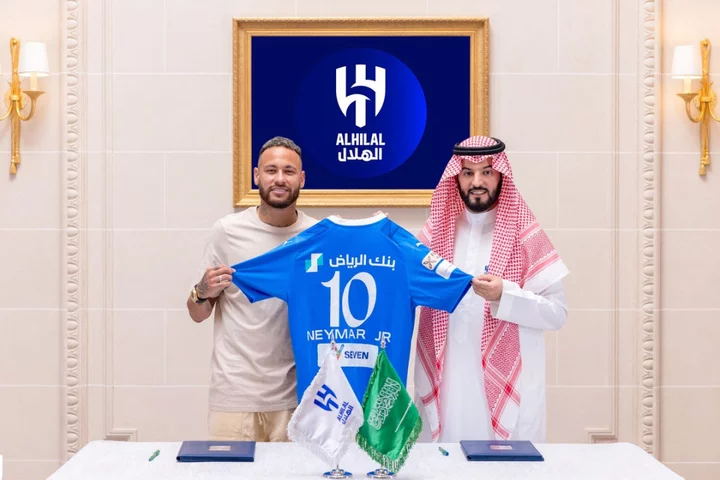
Farewell to Neymar, a European career played out in Lionel Messi’s shadow
Farewell, then, Neymar. He is only 31, but his choice to leave Paris Saint-Germain and join Saudi “giants” (his word) Al-Hilal – eight months after what was likely his last shot at winning the World Cup – feels like the beginning of the end for Neymar at the top of the game. It has, for the most part, been a joy. “He makes football a pleasure,” once said Pep Guardiola. Neymar would choose to dribble into a maze of defenders rather than play a simple pass, but invariably he would come out with the ball at his feet. His highlights reel is full of jinking runs and cheeky nutmegs, most of which lead to little, and often his skills seem pointless, like controlling a high ball wth a Cruyff-turn. But then what is pleasure if not acting without necessity, just for the fun of it? He has won almost everything – multiple league and cup titles, the Champions League, the Club World Cup and the Olympic Games – and yet looks set to end his career without the World Cup his nation expected or the Ballon d’Or his talent merited (he twice finished third). It would be easy to conclude that Neymar lacked application, particularly at PSG. His appearance record – never playing more than 22 games in a single season for the club – hints at a deeper malaise beyond the recurring injuries that dogged his time in Paris. PSG fans grew weary of Neymar, while his support for Brazilian far-right president Jair Bolsonaro made him even easier to dislike. But no one can ever say he didn’t care about football. Neymar wept in the dressing room before his final game for Santos. He wept when PSG lost the 2020 Champions League final to Bayern Munich in Lisbon. He wept on Lionel Messi’s shoulder after losing the 2021 Copa America final to Argentina. He wept when Croatia came back to win on penalties in Qatar. Expectation was the constant background noise to Neymar’s career, and the pain of defeat was visceral. His decade in Europe was played mostly in his friend Messi’s shadow. The only player on the planet better than Neymar in every facet of the game was on the pitch for most of his 359 matches for Barcelona and PSG. It must have been frustrating at times that his greatest accomplice was also a source of shade, even if they formed one of the greatest teams of all time – Barcelona’s treble-winning 2014-15 side – with that fantasy front three with Luis Suarez. They played with joy, and Neymar was the epitome of that. Like his club career, Neymar’s international legacy is framed by Messi. The 2021 Copa America final between Argentina and Brazil was billed as a fight between the countries’ two talismen, each with a chance to finally unload the burden they had carried for so long. Neither played particularly well that night in the Maracana, but it was Messi who celebrated and Neymar who needed consoling. Qatar 2022 was Neymar’s best chance to win the World Cup. He had sat in the stands injured watching Brazil lose 7-1 to Germany in the Maracana in 2014; he was powerless to stop a brilliant Belgium win in the quarter-finals at Russia in 2018. But Brazil arrived in Qatar as the pre-tournament favourites, ready to finally deliver on his destiny. So when he scored that mesmerising goal against Croatia in extra time of the quarter-final, weaving through an entire defence from a standing start to finally break the deadlock, if felt like that would be the goal to define his career, the one shown on repeat when future generations looked back at Brazil’s 2022 World Cup triumph. Instead Croatia came back and it was Messi’s goal a few days later that provided the tournament’s iconic moment, and Messi’s destiny which was fulfilled. That felt like Neymar’s last shot at the Ballon d’Or, which usually requires a Champions League or World Cup to convince its audience. And perhaps his move to Saudi is a tacit submission of sorts, a white flag in his long battle to transcend the Messi effect. The Independent has reported how Neymar tried to force a move to a Champions League club this summer, but couldn’t find a suitor. The footballing world stopped believing he could transform the most important games and the offers dried up. Instead he has accepted eye-watering paycheque along with his personal demands for three supercars, a 25-bedroom mansion, a very specifically sized swimming pool and a fridge permanently full of acai juice – the man loves his acai. And there is something ironic in Neymar leaving behind the giant profiles of Messi and Kylian Mbappe only to join Al-Hilal, a team with Cristiano Ronaldo. Perhaps he will be back in Europe before long. Perhaps the 2026 World Cup is still a realistic target – one last shot at winning the trophy he most craves, because really what can anyone possibly say once you’ve won that? But more realistic is that his move to Saudi Arabia erodes his already blunt edges, that other players overtake him in Brazil’s pecking order, that the European game moves on. His most famous goal remains one he scored aged 19 for Santos, which came after a dribble of unfathomable balance and control that requires rewinding like a magic trick. And perhaps, looking back, he could never have met the expectations he unknowingly set in that moment. Perhaps he did everything he possibly could have in the era of Messi. Read More Watch as PSG manager Luis Enrique holds press conference after Neymar departure Neymar departs PSG to become latest star signing for Saudi Pro League side Shots fired from Australia batter David Warner – Tuesday’s sporting social Neymar agrees Saudi move after only one European club showed interest Football rumours: Manchester United weighing up approach for Amadou Onana Kylian Mbappe set to return to PSG squad after ‘positive discussions’ – reports
1970-01-01 08:00
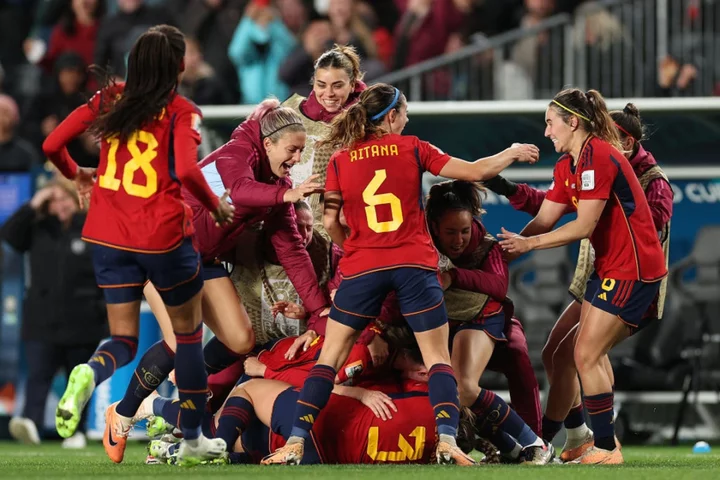
Infighting and rebellion: How Spain overcame themselves to reach edge of Women’s World Cup glory
With so much still unsaid around this Spain team, three statements over the last 48 hours stood out all the more, that illustrate much of the story of their Women’s World Cup run. One was Tere Abelleira immediately after the semi-final victory over Sweden in Auckland. “Now we can talk about a ferocious team spirit,” she said. It was as the midfielder was saying this in the Eden Park mixed zone that Jenni Hermoso was striding behind and shouting: “Come on! We’re in the final of the f***ing World Cup!” That is now the most important fact of all. It was amid this mood of jubilation, however, that the abrasive Spanish federation boss Luis Rubiales came out with something that was much more open to dispute. “What we have endured is a lot,” said Rubiales. “That questions have been asked of Jorge Vilda, who is a hard-working man, a world-class coach, who has turned down other federations that have offered more money and stayed with Spain. We have stuck with those who have always wanted to be here, that have valued the great work that he has done to grow, and we have forgotten the people with resentments. He has continued working with his people and not paid attention to those who wanted to destroy him.” It was the first time at this World Cup that anyone in the camp has publicly raised the squad mutiny that has shaped Spain’s entire run, since most of it has been set aside in an uneasy truce. The description of “people with resentments” sounds like the most cavalier way to blow all this up, especially as the biggest game of all remains. While that “ferocious team spirit” should be more than enough to keep Spain together through the build-up, there is still the possibility for a huge fall-out if this team is defeated by England on Sunday. Rubiales’ words only add another edge to a situation that is already hugely complicated, both in terms of how it came to this and how everyone is dealing with it. It is not just about Vilda, although he is the most public face, visibly ignored by some players in victory but embraced by others. The 15 players who last year sent the email resigning from the national team – with the tacit support of Alexia Putellas, Jenni and Irene Paredes – had several complaints. Most focused on how oppressively disciplinarian Vilda’s managerial regime was but they were also unhappy about how outdated the entire international set-up seemed. Some of the arrangements, like travelling long distances on bus or not having staff in certain key roles, fell well below their club standards. They did not feel any of this gave them the best possible chance of fulfilling a generation of talent. Unsaid but undeniably perceived by so many around the situation is that some of the players do not think Vilda is a good enough manager. There is at least a fair argument to this, even as Rubiales protested he is “a world-class coach”. Many would certainly dispute that. That Vilda has such a strong relationship with Rubiales is just another complication. With the federation risking the chance of a generation, and some players realising the same, overtures were made. Hermoso and Paredes returned, opening a way back. The federation’s director of women’s soccer, Ana Alvarez, met with every single player individually over May and June. All complaints were heard. Only some players were accepted back, and that involved having to send an email declaring their willingness to be called up again. They were Ona Batlle, Mariona Caldentey and – above all – Aitana Bonmati, perhaps the best player in the world right now. Vilda decided to stick with the players involved in preparation for this World Cup, just as Rubiales decided to stick with him. It has resulted in a squad that is partly made up of rebels and replacements. Some have set aside grievances for the greater good. Others are grateful to Vilda for persisting with them. All have overlooked this for the time being, which was why Rubiales so abrasively addressing it before the final is such a risk. It has only complicated already conflicted feelings around this Spain team. A growing view at this World Cup and back home in Spain has been that most support the players but do not want the national team to win because that is a vindication for the federation and Vilda. It doesn’t help Rubiales that he is not a popular figure, commonly seen as one of the most divisive in Spanish sport. There is also some inevitable backlash against the players, since there is the constant threat of the issue getting subsumed into the usual culture wars, but this is where the general public parking of the mutiny has at least offered something like a positive. One figure with insight into the situation spoke of how there can be internal conflict for some players, too. They want to do the best for themselves, but know that every success makes the federation and the manager look good. For the moment, at least, it has been a more unusual example of the classic dynamic of adversity creating success. There has also been compromises and common ground. Vilda’s staff have softened some approaches. The federation has listened and acted on other concerns, such as the willingness to move camp when the players were bored out of their minds in Palmerstown North. Some of Vilda’s calls have worked, such as bringing teenage sensation Salma Paralluelo on as a substitute to break games. Others would say that’s just an obvious move. There is also a more obvious fact here. In a historic football shift that long preceded Rubiales, and greatly influenced the English Football Association, Spain were one of the first wealthy western European football cultures to implement the kind of coaching revolutions that has characterised the modern game. The country industrialised talent production, while going further than most similar federations in underpinning it with a defined football identity. While that has almost come back on itself in the men’s game, creating this self-repeating and now almost self-defeating cycle of the ball endlessly getting circulated, the more developmental stage of women’s football means it can be much more effective. Spain are one of the few teams at this World Cup with such an ingrained style, made in Barcelona, that goes much deeper than any coaching decision. The wider national coaching structure has meanwhile honed the natural talent of stars like Putellas and Bonmati, producing elite athletes that also have that resilience that has been so apparent at this World Cup. The likelihood is that this supersedes any of Vilda's decisions. The squad’s mentality has helped, which is why they didn’t buckle after the collapse against Japan during the group stage. In a strange way, that 4-0 defeat might even have served them, helping to solve further tactical issues. Bonmati even said at the time “this is going to unite us more than ever”. It could mean Spain become the only world champions in either men’s or women’s football to have also lost by more than three goals in the same competition, other than West Germany 1954. Japan 2011 are the only previous Women’s World Cup winners to have even lost a game, adding one other little twist. There is then one final layer. It was the frustration at a defeat to England in the Euro 2022 quarter-finals that brought all this to a head. It is now an even bigger game against England that might fully illustrate how they have adapted. A lot may remain unsaid after Sunday but, to use an old Spanish football saying, some of the truth will be on the pitch. Read More Gustaf Lagerbielke set for Celtic bow after Stephen Welsh sustains knock Theo Walcott shares career highlights as he announces retirement from football Ange Postecoglou insists Tottenham have to be ‘united on and off the field’ Gustaf Lagerbielke set for Celtic bow after Stephen Welsh sustains knock Theo Walcott shares career highlights as he announces retirement from football Ange Postecoglou insists Tottenham have to be ‘united on and off the field’
1970-01-01 08:00
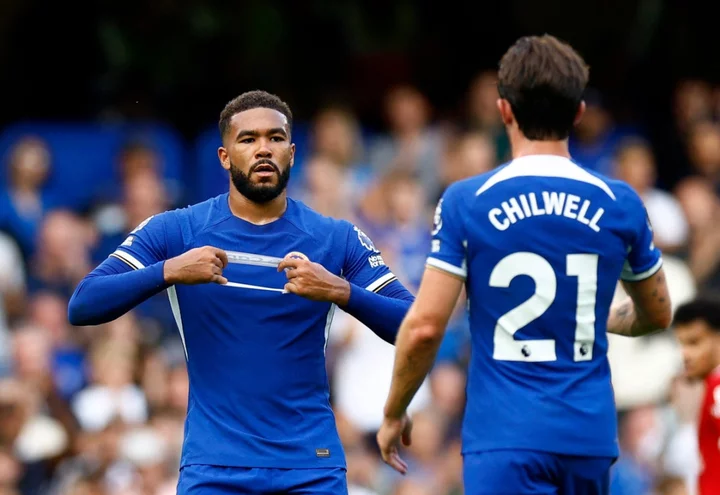
Reece James injury: Chelsea captain expected to be out for weeks with hamstring strain
Reece James has been ruled out of Chelsea’s weekend visit to West Ham and could face several weeks on the sidelines after sustaining a hamstring injury in training. James, 23, was made club captain by new manager Mauricio Pochettino in the summer, but his first game leading the side ended early when he was replaced in the second half of the 1-1 draw with Liverpool. Aftewards Pochettino insisted James was suffering only from fatigue and would be fit for the Blues’ visit to the London Stadium. But the defender has now picked up a muscle strain that adds to his long line of injuries disrupting his progress at Stamford Bridge. A statement said: “Reece James is starting rehabilitation having undergone assessments on an injury sustained in training this week.” Meanwhile, Chelsea have completed the signing of 19-year-old defensive midfielder Romeo Lavia from Southampton on Friday after agreeing to a reported transfer fee of £58m. The Belgium international signed a seven-year deal after reportedly rejecting a proposed move to Liverpool. The spending spree at Stamford Bridge continues with Lavia arriving just days after Chelsea signed Ecuador midfielder Moises Caicedo from Brighton for £115m. Caicedo's signing took Chelsea's spending on players to almost £1bn in 15 months under its new American owners. The highly rated Lavia has played only 29 times in the Premier League. “I’m really happy to join Chelsea and be a part of this exciting project,” Lavia said in Chelsea’s announcement. “It’s an amazing football club with a great history and I’m really excited to get started. I can’t wait to meet all my new teammates and build a chemistry together to achieve great things together.”
1970-01-01 08:00
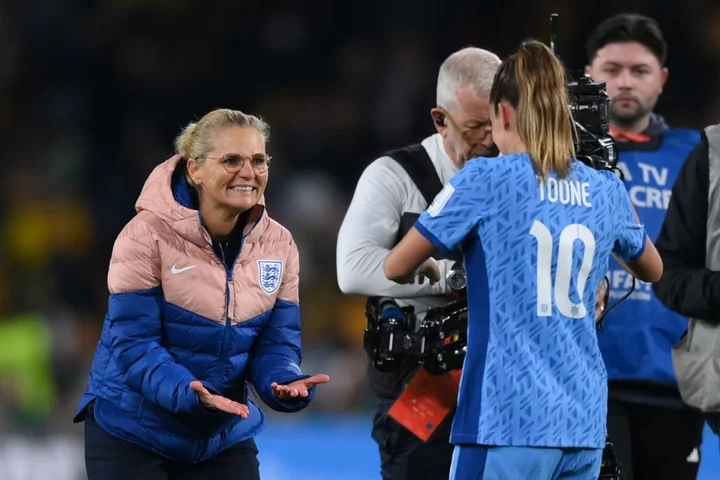
Sarina Wiegman commits future to England after USA speculation
Sarina Wiegman is happy as England manager and wants to see out the remainder of her contract, despite speculation linking the Lionesses boss to the United States. Wiegman, who will lead England into their first Women’s World Cup final against Spain on Sunday, is set to attract interest from the USA after the resignation of head coach Vlatko Andonovski - following their huge underperformance and last-16 exit at the tournament. The Dutch manager has an outstanding track record and is the first head coach to reach the Women’s World Cup final with two different teams, after guiding her native Netherlands to the final in 2019. Wiegman also ended England’s 56-year wait for a major trophy when the Lionesses won the Euros last summer, with the Dutch also winning the European championships on home soil in 2017. The FA said on Thursday that they would “100 per cent” reject any approach for Wiegman before the end of her contract, which is through to the end of the Euros in 2025, and the 53-year-old confirmed she would not consider any offers after the World Cup. “I’m really enjoying my job and I have the impression that people still like me doing that job,” Wiegman said on Friday. “I have no plans to leave.” When asked about the open position with the USA, the four-time World Cup champions, Wiegman replied: “I’ve heard [about] it. I’m with England, I’m really happy with England and I have a contract until 2025.” While Wiegman is preparing for Sunday’s World Cup final against Spain in Sydney, there is also the potential that the 53-year-old takes charge of a Great Britain team at the Paris Olympics next summer, ahead of the defence of England’s European title in 2025. Wiegman, meanwhile, would not comment on the pay gap that exists between herself and male counterpart Gareth Southgate, the manager of the men’s team. While Wiegman’s annual salary is £400,000, men’s boss Southgate is reportedly paid £5m a year. “Well, first of all I think I feel very comfortable with where I am right now,” Wiegman said. “The FA treats me very well. And that’s the only thing I want to say about that now because I’m really focused on the game.” Read More Women’s World Cup LIVE: Sarina Wiegman says ‘everyone’s talking about 1966’ and backs England to end 57 years of hurt Sarina Wiegman: ‘Stop talking about the result — we know what we want’ Ella Toone or Lauren James? Sarina Wiegman has already made the biggest decision of England’s World Cup
1970-01-01 08:00
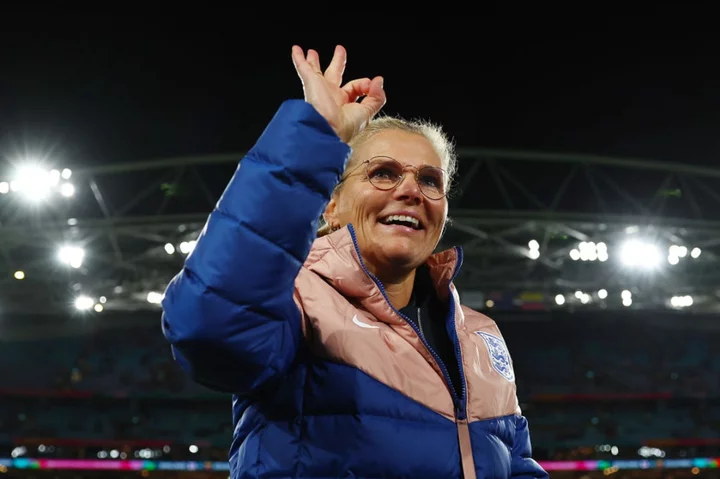
Sarina Wiegman: ‘Stop talking about the result — we know what we want’
When it gets to this stage before a big game, even someone as experienced as Sarina Wiegman finds she can’t take her mind off it. Or, rather, she doesn’t want to take her mind off it, which is precisely why she’s so experienced. “No, and I don’t want to relax,” she smiles. “It’s Spain,” Wiegman says of her thoughts before taking on Sunday’s opponents. “Everything now is Spain. When you’re so close, well, I have that feeling a little bit anyway, but when you go to the next game, you’re only thinking ‘OK, what’s next? What can we get in front of us? What challenges can we expect? How are we going to prepare the team? “I just want to get ready.” Wiegman has ensured England have never been more ready. The national team are on the brink of bringing a decade-long project to glorious completion and winning a first ever Women’s World Cup because of her crucial influence. The 53-year-old from The Hague can now be classed as the best manager in the game. While the key elements of that story are tactics, patience, strategy and the will – as well as investment from the FA – to hire a manager this good, there is also something acutely personal. Wiegman can talk with authority about the rarefied build-up to such games because this is her fourth major international final, and her second World Cup final. It may also be her first World Cup final win. She has already got so close with the country that means the most to her, having narrowly lost 2-0 with the Netherlands to the USA in Lyon four years ago. Something has changed for Wiegman since then, though. England has changed her, even if her effect on the national team has been far greater. The manner in which Wiegman quickly moves on from questions about herself to talking about the collective is fairly typical, especially in the days before a game. She tends to be much more expansive after a match, and the belief from those who know her is that it’s not just about ultra-focus. It’s also about giving absolutely nothing away to the opposition. She is that guarded when it comes to the game. One of the more surprising elements of a sit-down with Wiegman at England’s Terrigal base, so close to the biggest fixture in sport, is how relaxed she is and how willing she is to get into the personal. There is constant laughter – especially as she elaborates on Dutch directness against English politeness – but also a moment of poignancy as she discusses the various challenges she and the team have faced. The injuries are only a small part. Of true significance is her ongoing adjustment to life without her sister, who tragically passed away shortly before the Euro 2022 campaign. “I’m a pretty positive person but of course I also have feelings,” Wiegman says. “I feel very privileged to work with this team. It has been so great. You have some setbacks with some players that got injured, which was very sad for them, but then you have to switch and say: ‘OK, this is the group of players we think are the best and this is the team now. We are going to go to the World Cup with them.’ “Then of course there are still things in my personal life. When someone passes away who is really close to you, you don’t just say: ‘Oh, it’s two months now, it’s gone.’ I have strategies but of course sometimes that’s still sad and it is challenging for me too.” It was Wiegman’s human nature, as much as her managerial insight, which was why the Football Association were so willing to wait for her in September 2021. So many of the other pieces were already in place, not least a brilliant generation of players. That came from a coaching revolution, and huge investment in the wider game. It just needed, in the words of chief executive Mark Bullingham and women’s technical director Kay Cossington, someone to bring it all together. “She’s created a really strong culture,” Bullingham says. “You can see what she brings in camp in terms of the togetherness. You can see how she galvanises anything, the fact there was a strong plan in place already just means it’s come to fruition really nicely.” That does make it sound much easier than it was, which is admittedly how Wiegman makes it look, certainly at Euro 2022. Even to get there, she had to work around English football culture as much as with her squad. So much of that still centres on 1966, that long wait, that block. “I know it’s there,” she says. “When we started working, September 2021, I felt that the country was so desperate to win a final in a tournament. Everyone was saying that and the players too. I thought: ‘It’s very real’.” She felt it was having an effect, so had to work against it. “If you want to win it too much… so what do we have to do? What do we have to do to win, and how can we win? To get results, stop talking about the result because we know what we want. I heard again: 1966. Everyone’s talking about 1966. So let’s be at our best on Sunday and try be successful.” While she insists she gets “out of the noise”, she is clearly animated by this topic, as she immediately apologises for interrupting another question to go straight back to it. “Another thing: football is so big in England. It’s so in the culture. That’s incredible to experience. It’s so big. It’s everywhere. That’s pretty cool, too.” The way Wiegman speaks about this gives an insight into how she works. She doesn’t view it as a profound issue of national identity. She views it as just another problem to solve. That has been the story of her time in the job and, especially, this campaign. Runs like Euro 2022 and this World Cup don’t just come from placing someone like this in a job, after all. It requires proper impact on the training ground. Wiegman found this very quickly with how she figured out the team before Euro 2022, and it admittedly did help that almost everything seemed to go for England in that tournament - not least home advantage. This World Cup has been the exact opposite. Almost everything has gone against them, right down to the crowd in repeated games, above all that semi-final against Australia. Every test has just given Wiegman and her team something new, though, particularly England’s 3-5-2 formation. The biggest test was clearly the loss of three key Euro 2022 players in Leah Williamson, Fran Kirby and Beth Mead, with Lauren James’ suspension from the last 16 only compounding that. As tends to be the case with Wiegman, she and her staff had already anticipated some of the problems. As has tended to be the case with this World Cup, though, there were still more issues. One was how constricted the team looked in those opening 1-0 wins against Haiti and then Denmark. “During the tournament in the first two matches we were struggling a little bit and we had moments where we played really well but we also had moments where we were a little bit vulnerable. So, after the second match, Arjan [Veurink, assistant manager] came to me and said: ‘Sarina, let’s sit down, isn’t this the time to go to 3-5-2?’ “I said: ‘You’re completely right, this is the moment’. With how the squad is built, and the players available, we can get more from the players and their strengths in this shape. So then we changed it.” Tactical insight alone only goes so far, though. Maximising it depends on communication, and understanding. This is another of Wiegman’s qualities. The players feel she is very straight with them. Some of this might touch on her own thoughts about English politeness against Dutch directness. She feels she now understands her adopted country much more. “I tried to learn a little bit more about the English,” she says. “The sayings sometimes are a problem, so I’m trying to learn a little bit more. I do think I understand the people a bit more but English people are very polite and sometimes you go ‘OK, are you now being polite or are you really saying what you mean? “And that’s sometimes finding a balance, because you don’t have to be rude to be direct, so I ask the players and the staff: ‘You can be honest’. It doesn’t mean that you’re rude. Just be direct.” Dutch, in other words? “Yeah,” she laughs. “Dutch, but direct doesn’t mean rude. You can just say what you think and still be very respectful.” It’s why you can take her at face value when she says she isn’t considering any overtures from the United States. Wiegman of course doesn’t actually want to be discussing any of this now, and not just for reasons of diplomacy. “We are in the final, but everything now, all my thinking, is how do we beat Spain.” It’s an insight into why she’s there in the first place. Read More Sarina Wiegman commits future to England after USA speculation England’s deadly duo have already provided the answer to the Lauren James debate What time is the World Cup final on Sunday and who will England play? Sarina Wiegman v Jorge Vilda – a look at the World Cup final coaches Eddie Howe wishes ‘remarkable’ England well in World Cup final Sarina Wiegman clarifies England future after USA speculation
1970-01-01 08:00
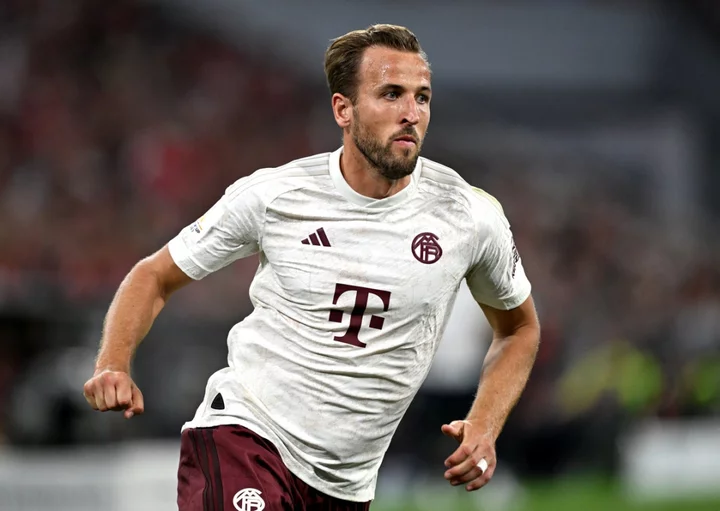
Harry Kane is Bundesliga’s greatest weapon in battle for eyeballs
“It is definitely not going to stay stuck in my head,” said Jamal Musiala, but it will probably remain lodged in the minds of many in the Dortmund area. It was the late goal the 20-year-old scored at Koln on the last day of the season, meaning Bayern Munich won their 11th consecutive Bundesliga. By default, perhaps, given that Borussia Dortmund spurned a golden chance to end the longest spell of domination in the Bundesliga’s 60-year history, missing a penalty and going 2-0 down at home to Mainz. An eventual 2-2 draw left Dortmund in their familiar role: in seven of those 11 seasons, they have finished runners-up to Bayern. Summer in Germany has been shaped by a trio who could have been England teammates: Musiala, the Stuttgart-born, Whitgift School-educated prodigy who chose to play for Germany; Jude Bellingham, the Bundesliga’s reigning Player of the Year but whose knee injury left him an unused substitute in Dortmund’s final-day heartbreak and who then decamped for Real Madrid; and Harry Kane, the £100m man who is the most expensive signing in the division’s history. There is a temptation to brand it as the biggest in years, too, though in reality last summer Sadio Mane joined Bayern, a few months before finishing as the runner-up in the Ballon d’Or and from a club, in Liverpool, at a rather higher ebb than Tottenham are now. Yet the England captaincy confers status and, while the Bundesliga has proven itself as a finishing school for young British talents, most notably Bellingham and Sancho, the 30-year-old Kane arrives at the peak of his powers. He draws attention to a division that can be both admired for its principles and feel overlooked in the battle for global television ratings. His league debut, at Werder Bremen on Friday, is the biggest game in world football at the time: his home bow, against Augsburg on Sunday week, clashes with Newcastle against Liverpool, plus Barcelona’s trip to Villarreal. Viewing figures for each may be instructive. “Harry Kane will not only strengthen FC Bayern but also be a real asset to the entire Bundesliga,” said Bayern president Herbert Hainer. Arguably, however, there is a contradiction there: Kane makes Bayern likelier Champions League winners but while the Bundesliga has had competitiveness and social mobility in most other sections of the table, not at the top; until last season, anyway, and Kane could reassert Bayern’s superiority. Only goal difference separated them and Dortmund in May, but seven of the Bavarians’ 11 titles have come by at least 10 points, two by more than 20, and the transfers of two Englishmen could shift the balance of power emphatically in their direction. Certainly, there are reasons to believe last season was Dortmund’s big chance: when Bayern had lost Robert Lewandowski when Mane’s move didn’t work out, when Julian Nagelsmann was sacked, when Thomas Tuchel got worse results than his predecessor. But the former Dortmund coach Tuchel provides one of the subplots this season: given more power on Sabener Strasse after chief executive Oliver Kahn and sporting director Hasan Salihamidzic were fired, the Anglophile manager tried to sign everyone from Declan Rice to Kyle Walker. A bid for Kepa Arrizabalaga, a goalkeeper he benched at Chelsea, failed, leaving Bayern looking for a deputy for the still-injured Manuel Neuer. In Kim Min-jae, however, he has a high-class recruit in the middle of the defence and with Kane, a conventional No 9, the side is otherwise strengthened (the post-Lewandowski void was not just felt at Bayern: the Pole had been the division’s top scorer with 35 in his final season whereas last year, for the first time in Bundesliga history, no one got more than 16). Yet Tuchel has underachieved so far and Bayern can be a febrile, political club. Dortmund, meanwhile, showed great unity after crushing disappointment. Edin Terzic, the coach and lifelong fan, was tearful after the failure to beat Mainz. The process of replacing Bellingham has started with the signings of midfielders Felix Nmecha and Marcel Sabitzer, the latter from Bayern; the trade between them has continued with Raphael Guerreiro going in the other direction. Dortmund have grounds for optimism in their vastly superior form after the World Cup, when they won 15 and lost just one of 19 games, and in the prospect of what Sebastien Haller and Karim Adeyemi might do: neither scored a league goal before the World Cup last season, when the striker was recovering from testicular cancer and the winger made a slow start, but each is a match-winner. RB Leipzig condemned Kane to an unhappy start by beating Bayern 3-0 in the Super Cup. It amounted to an eloquent response to the loss of their four best players, in Josko Gvardiol, Dominik Szoboszlai, Christopher Nkunku and Bayern’s new recruit Konrad Laimer. The hugely gifted loanee from Paris Saint-Germain, Xavi Simons, and the RB Salzburg striker Benjamin Sesko look like the pick of their signings but logically Marco Rose’s team are weaker now. The Bundesliga may have a big three of sorts now, but that offers others the chance to play Champions League football. Union Berlin’s swift rise was capped by their fourth-place finish last season; Brenden Aaronson and Robin Gosens are among their summer additions. Freiburg and Eintracht Frankfurt, two who have shown their competitiveness on the European stage in the last two seasons, are contenders to break into the top four. So are Bayer Leverkusen, joined by Granit Xhaka and led by Xabi Alonso, who could further the Bundesliga’s reputation as a breeding ground for coaching as well as playing talent. Intrigue is offered, too, by Heidenheim, promoted to the Bundesliga for the first time in their history and from a town of fewer than 50,000 people; there is room for each one and more in the grounds of five second-flight clubs, in Schalke, Hamburg, Fortuna Dusseldorf, Nurnberg and Kaiserslautern. With Barcelona’s Nou Camp and Real Madrid’s Santiago Bernabeu undergoing works, Dortmund should have the biggest gates on the continent this season. The vast capacities of its grounds facilitate lower ticket prices and add to the popularity of German football: the Bundesliga’s average attendance last season, of 42,966, was the largest in Europe. Plenty of eyes will be on Kane in Germany, though the acid test may be how many outside Germany tune in, just as the test for Bayern is not whether they can win a 12th Bundesliga in a row but a seventh European Cup. Read More Harry Kane embracing new pressure after Bayern Munich move Harry Kane finally gets his move — but it’s not the one he wanted Tom Brady expects friend Harry Kane to have ‘new energy’ in Munich Lionesses and Man City celebrate success – Thursday’s sporting social Meet the 21-year-old Nigerian striker Spurs are lining up to replace Harry Kane Lionesses celebrate reaching World Cup final – Wednesday’s sporting social
1970-01-01 08:00
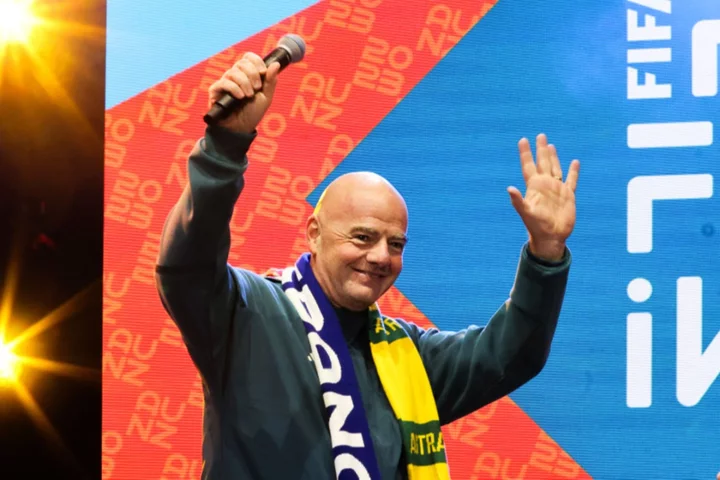
Gianni Infantino says ‘women have the power’ to achieve equality in football
Fifa president Gianni Infantino said it is women who “have the power to change” football and achieve equality in the game. It has already been a record-breaking Women’s World Cup, with the tournament in Australia and New Zealand setting its highest-ever attendance figures of over two million people as well as drawing booming TV audiences around the globe. The Fifa president also said the World Cup has generated over $570m (£447m) in revenues and has “broke even” financially ahead of Sunday’s final between England and Spain. There remains a huge discrepancy in prize money between the men’s and women’s World Cups, however. Despite a 10-fold increase from the last Women’s World Cup in 2019, the record prize money of $152m (£126m) announced by Fifa before the tournament remains some way short of the reported $440m (£365m) prize money on offer to teams at last year’s men’s finals in Qatar. While Infantino said Fifa remains on track to achieve equal pay between the men’s and women’s World Cup at the 2026 and 2027 tournaments, the Fifa president urged media and sponsors to step to help bridge the gap and said women “have the power to convince men” that equity in football can be reached. Infantino, who was speaking at Fifa’s women’s football convention in Sydney ahead of Sunday’s World Cup final, said in his closing remarks: “We have to start treating men and women, or women and men, in the same way. “And I say to all the women - and you know I have four daughters, so I have a few at home - I say to all the women, that you have the power to change. “Pick the right battles. Pick the right fights. You have the power to change. You have the power to convince us men what we have to do and what we don’t have to do. You do it. Just do it. “With men, with Fifa, you will find open doors. Just push the doors. They are open. And do it also at national level, in every country, at continental level, in every confederation. Just keep pushing, keep the momentum, keep dreaming, and let’s really go for a full equality. “Not just equal pay in the World Cup, which is a slogan that comes up every now and then. Equal pay in the World Cup, we are going in that direction already. But that would not solve anything. “It might be a symbol but it would not solve anything, because it’s one month every four years and it’s a few players out of the thousands and thousands of players. “We need to keep the momentum. We need to push it. We need to go for equality but we have to do it for real. And you, here in this room, all the women in this room, you have the power to do it. So believe in it.” Infantino hailed the impact of the first-ever 32-team Women’s World Cup, which led to historic achievements from several teams at the tournament and several shocks during the the group stages. Colombia, South Africa and Jamaica all reached the knockout stages of the World Cup for the first time, defying the odds to upset established nations such as Germany and Brazil. The Fifa president said the tournament has “simply been the best and greatest and biggest Women’s World Cup ever” and said the tournament has answered the “critics” who said the competition was expanding too quickly. “I’m sorry but Fifa was right. Fifa was right,” Infantino said. “As it happens quite often in the last years, Fifa was right once more.” He continued: “We didn’t lose any money and we generated the second highest income of any sport, besides of course the men’s World Cup, at a global stage. More than half a billion “There are not many competitions, even in men’s football, who generate more than half a billion. “This shows what? This shows that our strategy was probably not too bad. That, of course, we have to do still much better. “Before the beginning of the World Cup we heard some critical voices, but now we see the audiences. “So the pledge has to be, and to ask everyone, in terms of broadcasters, sponsors, partners, to of course pay a fair price to women’s football. Not to the World Cup, the World Cup has already generated over 570m, but to women’s football in general in all the countries, in all the leagues, in all the competitions.” Read More ‘Another reason to whinge’: Australian media criticise England after Matildas beaten at Women’s World Cup England’s deadly duo have already provided the answer to the Lauren James debate What time is the World Cup final on Sunday and who will England play? FIFA president calls for ‘full equality’ in football beyond Women’s World Cup ‘They abuse us’: Workers making Fifa World Cup merchandise face harm, says report What time is the World Cup final on Sunday and who will England play?
1970-01-01 08:00
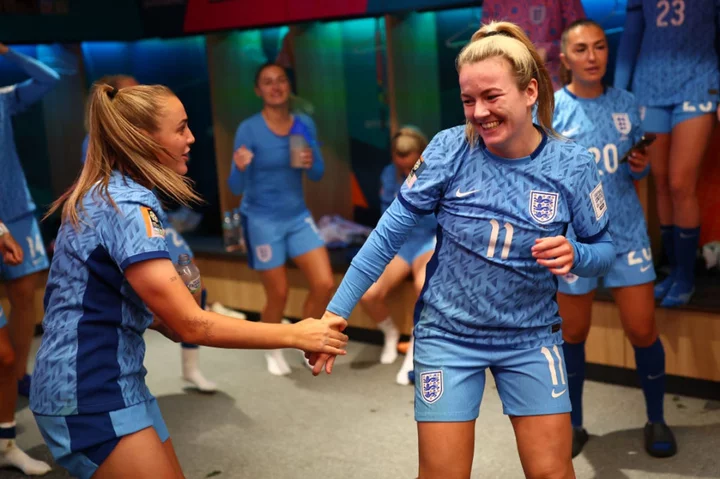
Women’s World Cup LIVE: England prepare for final against Spain and latest reaction to win over Australia
England are through to the Women’s World Cup final for the first time after a stunning 3-1 win over Australia in Sydney set up an all-European title decider against Spain on Sunday. Manager Sarina Wiegman said she was “in a fairytale” after guiding England to the final for the first time, while defender Lucy Bronze was overcome with emotion after playing in two previous semi-final defeats in 2015 and 2019. The Lionesses will play Spain on Sunday in England’s first World Cup final since 1966 and the nation is set to come to a halt as the team look to bring the game’s biggest prize back home. Meanwhile, the FA have confirmed that a plan is already in place for a statue of the England team at Wembley Stadium, while the governing body also said they would “100 per cent” reject any approach from the USA for the Lionesses manager. Follow all the reaction to England’s win against Australia in the semi-finals, get all the latest Women’s World Cup odds, including the latest third place play-off odds here: Read More England finally reach the world’s greatest stage — and that is worth celebrating England’s deadly duo have already provided the answer to the Lauren James debate How England deployed dark arts and cool heads to silence Australian noise
1970-01-01 08:00
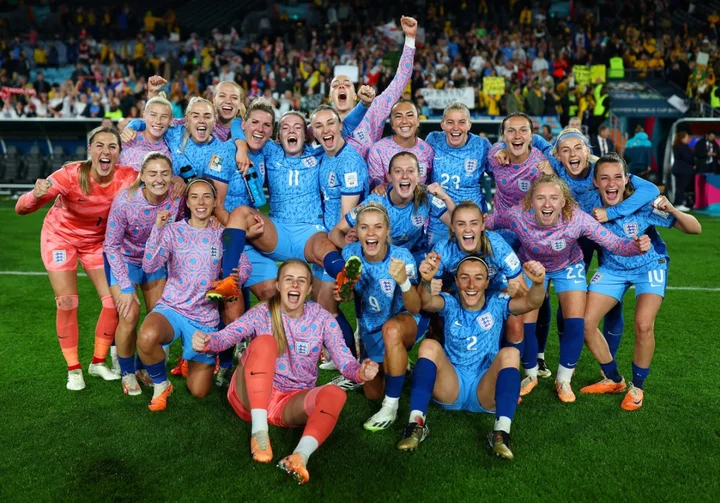
FA to build Wembley statue of England’s Lionesses after World Cup and Euros heroics
The Football Association has revealed that a plan is already in place following Euro 2022 for a statue of the England team close to Wembley Stadium. If England beat a fine Spanish side at Stadium Australia in Sunday’s World Cup final, any statue might have to feature two trophies, given their European triumph last summer. FA CEO Mark Bullingham revealed that the governing body was already in discussions about the design, as it would sit in the footprint of Wembley Stadium. “In terms of statues, it’s something we are looking at post-Euros. We’ve made progress on that, and it would be right to have something to commemorate that success outside Wembley. It would be the whole team. “Our starting point was more for plans around a collective, but we’ll see what design ideas come up. And you can imagine the iconic images that came out of the Euros. There’s some brilliant things which could be produced. Our starting point is that it’s a brilliant team. “We’ve made progress with the discussions, but I don’t think we can announce any more than that yet. You have to go through various permissions – we’ve gone through that. The next stage is working on the design. I don’t know the timescale because it’s not in our hands, it’s obviously related to Brent Council. I’m not sure I can give you an answer on that.” Bullingham meanwhile said talks still had to take place about the bonuses the players will receive – something their success in Australia has already changed – but claimed that the initial delay was down to Fifa announcing new prize money stipulations just before they travelled. “We’re sorting it after the tournament. I think they have a very strong case before, a very strong case after, but the reality is, there’s a discussion to be had. There wasn’t a lot of time before the tournament; Fifa announced the prize money very late, and a completely different model that led to a different type of discussion, so it just means there wasn’t a lot of time. It’s more time being an issue rather than anything else. “It wasn’t an issue on bargaining position, it was more an issue on time and working through this new model, so I think we’ll get to a good resolution. “Bonuses is always a percentage of prize money, that’s always the model. I think there are lots of discussions to be had with them, but we’ve invested heavily in them and the women’s game, and we want that to continue growing. We’ve got the opportunity to have some really interesting discussions after the tournament.” Sources close to the squad would insist that those discussions still have some way to go, as the FA has not moved on its position of having a bonus structure on top of Fifa prize money. The players also feel there was still plenty of time, as illustrated by the way in which senior FA figures did not get involved “until the last minute”. There have been no further discussions during the World Cup, as all have wanted to focus on trying to win the tournament. Read More ‘Another reason to whinge’: Australian media criticise England after Matildas beaten at Women’s World Cup How England deployed dark arts and cool heads to silence Australian noise Sarina Wiegman v Jorge Vilda – a look at the coaches in Women’s World Cup final
1970-01-01 08:00

US will not poach ‘special’ World Cup coach Sarina Wiegman, insists FA
The Football Association will resist any USA approach for Sarina Wiegman, chief executive Mark Bullingham has said. He also insisted that the ongoing players’ bonuses dispute is now merely a “matter of time” rather than detail, and revealed the FA will also seek to host the Women’s World Cup themselves. Wiegman is now one game away from a history double, as she took a senior English national team to a World Cup final for the first time. That has naturally attracted interest from the USA, whose coach Vlatko Andonovski resigned after a huge underperformance that saw the deposed world champions eliminated in the last 16. Bullingham said the FA would “100 per cent” reject any approach. “It is not about money. We are very, very happy with her and we feel she is happy. I think that is the answer. “We’ve seen lots of rumours and, look, she is a special talent. We’ve got a bit of time because obviously she’s contracted to 2025, and she’ll obviously want to have a decent holiday after this. But all I’ll say is we’re massive fans of her. We believe she’s happy, and we’d love to continue working with her for a long time.” While the US might bank on the possibility that she might want a new challenge if she does win the World Cup with England, there is also the potential ambition of doing a clean sweep with the 2026 Olympics. Bullingham meanwhile said talks still had to take place about the bonuses the players will receive – something their success in Australia has already changed – but claimed the initial delay was down to Fifa announcing new prize money stipulations just before they travelled. “We’re sorting it after the tournament. I think they have a very strong case before, a very strong case after but the reality is, there’s a discussion to be had. There wasn’t a lot of time before the tournament, Fifa announced the prize money very late and a completely different model that led to a different type of discussion so it just means there wasn’t a lot of time. It’s more time being an issue rather than anything else. “It wasn’t an issue on bargaining position, it was more an issue on time and working through this new model, so, I think we’ll get to a good resolution. “Bonuses is always a percentage of prize money, that’s always the model I think there are lots of discussions to be had with them, but we’ve invested in them heavily in them and the women’s game and we want that to continue growing. We’ve got the opportunity to have some really interesting discussions after the tournament.” Sources close to the squad would insist those discussions still have some way to go, as the FA have not moved on their position of having a bonus structure on top of Fifa prize money. The players also feel there was still plenty of time, as illusrated by how senior FA figures did not get involved “until the last minute”. There have been no further discussions during the World Cup, as all have wanted to focus on trying to win the tournament. Bullingham also said it’s a long-term plan to host a Women’s World Cup. The FA may have to wait, however, as Germany-Netherlands-Belgium are the European bid for 2027, and if they do win, it would mean a tournament on another continent in 2031. “In terms of bidding, we’re obviously conscious we’ve had a lot of tournaments,” Bullingham said. “We’ve put a bid in for Euro 2028, and that’s obviously a big commitment. We would love to host Women’s World Cup one day, don’t get any doubt on that, we’d love to do that. If you look at the landscape, you’ve got Germany and Netherlands bidding for 2027. If they’re successful, there wouldn’t be a European bid for 2031 if they aren’t successful so you want to see maybe they go again so that would potentially be the one after that. If you’re asking us whether we would like to host World Cups, of course, we would love to.” Read More ‘Another reason to whinge’: Australian media criticise England after Matildas beaten at Women’s World Cup How England deployed dark arts and cool heads to silence Australian noise Sarina Wiegman v Jorge Vilda – a look at the coaches in Women’s World Cup final FA to build Wembley statue of England’s Lionesses after World Cup Premier League looking into ‘historic’ financial issues at Chelsea Chelsea face Premier League probe over alleged financial breaches – reports
1970-01-01 08:00
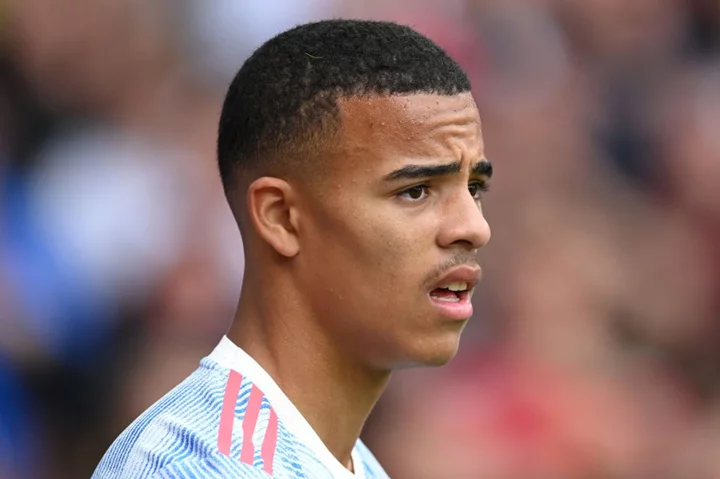
Mason Greenwood, Manchester United and football’s dark double standards
“Intense internal deliberation,” Manchester United called it in something of a holding statement. Mason Greenwood’s future is the subject of rather more than that; it is a situation with considerable and potentially colossal implications, on and off the pitch. It will affect, and probably damage, United’s reputation. It will probably give their various sponsors a question of whether to terminate their relationship with the club. It certainly could bring a backlash against entirely blameless players in their women’s team. At some stage, an announcement will come whether Greenwood’s contract is terminated or whether he will play for United again. The club said the “fact-finding” stage of their investigation into his conduct is complete and that chief executive Richard Arnold will make the final decision; and yet the belief is that the decision is made and that Greenwood will stay. This is a moral, commercial and footballing issue: even perhaps the world’s biggest club have seemed ill-equipped to deal with an issue of its magnitude and sensitivity. The bare facts are that in January 2022, disturbing audio emerged of a voice, assumed to be Greenwood’s, as a man tried to force himself upon a woman. Greenwood was subsequently arrested and later charged with attempted rape, assault occasioning actual bodily harm and controlling and coercive behaviour. The charges were dropped in February 2023 by the Crown Prosecution Service when new material emerged and key witnesses withdrew their involvement. United then opened their internal investigation. Since then, Greenwood has remained suspended by the club, unable to play or train. United can argue a six-month investigation is a sign of how thorough it has been: they say they have spoken to plenty of people and considered evidence that is not in the public domain. Yet concluding it was always likely to be a problematic part: perhaps it would have been easier if it was done in June, in the off-season. Instead, it has been mishandled. United had communicated privately that they would reveal their decision before the start of their campaign. It kept being put back: originally slated for 4 August, it was later said it would not be made on last Wednesday or Thursday, then not on Friday, either. But part of the process was that United needed to communicate with what they termed key stakeholders: they include sponsors and commercial partners, fans’ groups and their women’s team. And the fact that some of the players are in Australia, trying to win the World Cup, seemed to have passed United by and led to suggestions the decision was in their hands and the sadly inevitable social medial abuse. With the Women’s World Cup final on Sunday and the prospect of the players having time off before returning to United, it means an announcement may not come until September. But, with each step, it seems ever more likely that they are trying to find a way to explain that Greenwood will return to the club. There is little doubt that keeping Greenwood would bring outrage, and not merely outside Old Trafford; certainly some staff would be unhappy and it would be entirely understandable if members of the Women’s side were too (that United only formed a Women’s team in 2018 showed a lesser commitment than many of their rivals displayed). Eight of the men’s squad have joined since Greenwood last played but he is not thought to have been universally popular in the dressing room when he was involved. Meanwhile, there are other aspects to consider. The alleged victim cannot be named for legal reasons; her anonymity is important, though it also means the picture visible to the wider world is incomplete. United are yet to divulge the findings of their investigation. One finding, in particular, should be key in a society where there ought to be some scope for rehabilitation of the repentant: is Greenwood sorry or just sorry he got caught? He and United can argue that he was not convicted of any criminal offence, though that does not automatically render him an innocent man. They can say he has suffered a punishment by already losing 18 months of a relatively short career. They would probably be right if they concluded that virtually any other club would keep Greenwood; unpleasant as that suggestion will be, it is a reality of football. Even for a club of United’s wealth – with an annual turnover of around £600m and having spent about £170m on signings this summer – would be reluctant to let a footballer with the talent to be worth £100m go. Their owners, the Glazer family, have rarely seemed aligned with what fans desire. The manager, Erik ten Hag, has a team who scored too few league goals last season. Meanwhile, Greenwood, still only 21, is United’s youngest goalscorer in Europe; only Norman Whiteside and George Best scored more for United as teenagers. Does any of that matter? Many would say no. In an assessment of his character, it certainly does not. But there is a double standard in football. Were a steward, a kitman or a press officer to have behaved as Greenwood did, it would be a simple decision to dismiss them for gross misconduct. But footballers are treated differently and United are wrestling with the question of how to justify that. Read More Man Utd confirm Greenwood investigation is over - but no decision on future made Manchester United delay decision over Mason Greenwood’s return Michael Olise signs bumper new deal as Crystal Palace fend off Chelsea interest Michael Olise signs bumper new deal as Crystal Palace fend off Chelsea interest US will not poach ‘special’ World Cup manager Sarina Wiegman, FA insists Premier League clubs interested as race for Jeremy Doku’s signature heats up
1970-01-01 08:00
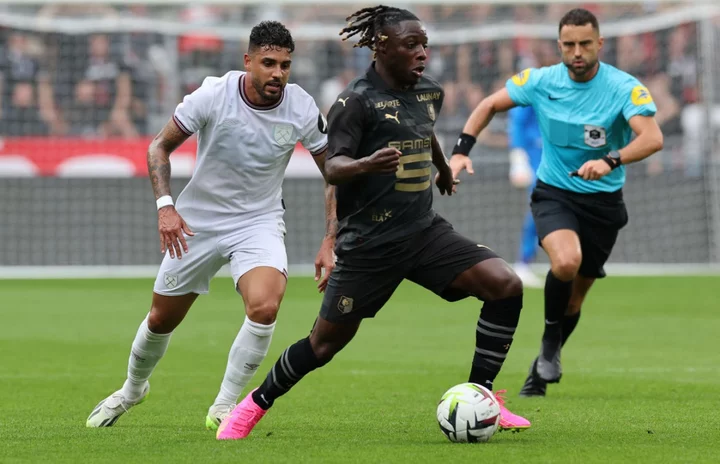
Premier League clubs interested as race for Jeremy Doku’s signature heats up
All of West Ham United, Manchester City and Tottenham Hotspur are trailing Rennes’ Jeremy Doku, in a race that could go to the end of the window. While Spurs and - above all - City can make persuasive claims about going to clubs that can compete at the very top level, West Ham are able to offer regular first-team football. The east London club are consequently more advanced in their approach, and already have an offer in. That is understood to be less than £50m, though, which is the price currently seen as necessary to get the Belgian international. City aren’t that far along but are confident of doing a deal for Doku and West Ham’s Lucas Paqueta in the next two weeks. Should that happen, it is possible that West Ham do benefit through a loan for City’s Cole Palmer. There is a feeling that whoever doesn’t get Doku will then move for Eberechi Eze from Crystal Palace. The Selhurst Park club are currently trying to agree a new deal, though, having already tied down Michael Olise. The search for wide players is currently one of the most competitive in the market.
1970-01-01 08:00
